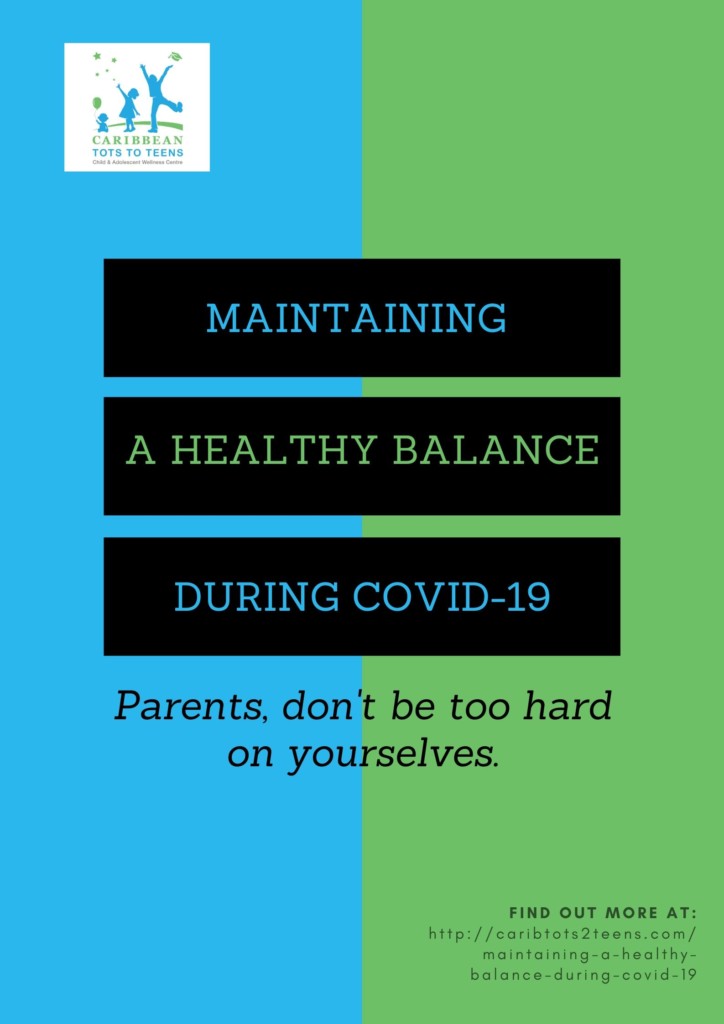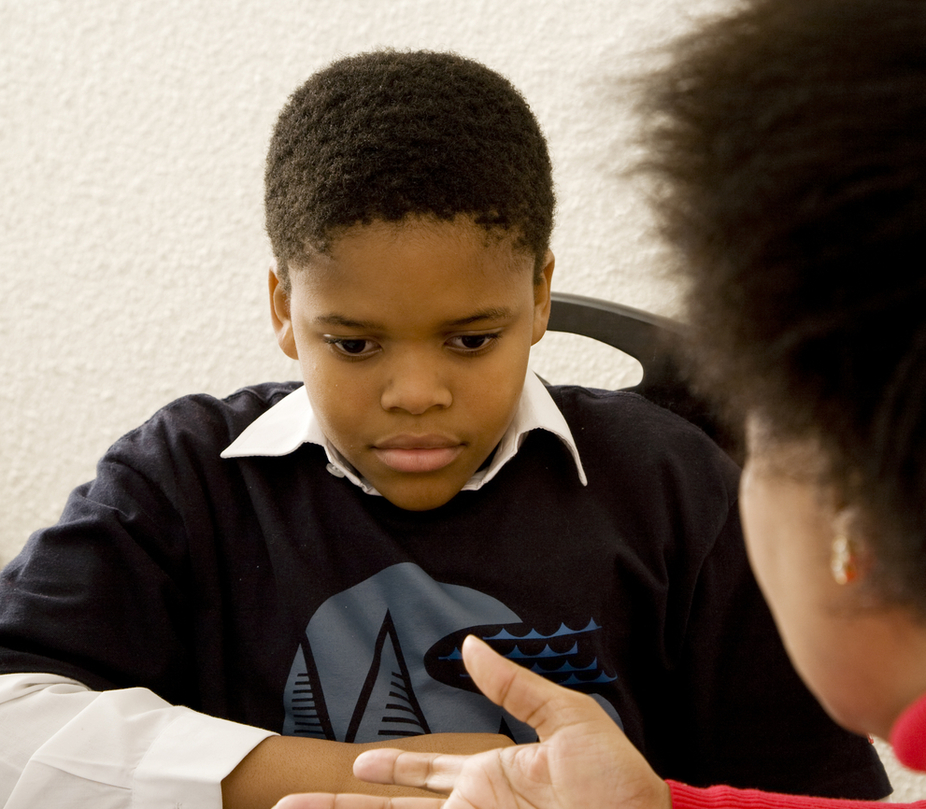Maintaining a Healthy Balance During COVID-19

Due to the outbreak of COVID-19 parents, guardians and children are now dealing with major disruptions in their daily lives. Moving work life and school life into the home is not an easy task and can result in stressful and/or anxious feelings. In order to manage stress and anxiety remember to:
- Be aware of disruptions in your sleep pattern and eating habit, change in mood and concentration
- Take care of yourself; take breaks periodically, eat healthy and exercise
- Create supportive network with coworkers, supervisors, and family members
- Schedule activities with the family; include family relaxation time
Create a suitable environment at home that is conducive for work by:
- Ensuring a comfortable workspace within your home
- Being comfortable with yourself and wearing what makes you feel relax
- Setting schedules that are convenient for the family; taking into consideration early mornings when everyone is still asleep, when children are having lunch, or during relaxation period for children.
- Maintaining regular work schedule; avoid burnout by working extended hours at home
- Daily reflecting and reviewing what worked and what did not work, and implement the necessary adjustments
- Setting realistic expectations; you may not be able to accomplish the same goals at home as you would being in a work environment, while managing children at home and working from home
- Realizing that things will go wrong, and accidents are prone to happen; children will accidentally interrupt a meeting, the sound of the dogs barking while talking to a client, baby will get anxious and irritable. Do not be too hard on yourself
Prepared by: Camille Campbell
Adapted from: The Bellarmie University: https://www.bellarmine.edu/news/archives/2020/03/18/covid-19-expert-keim-working-from-home/
Learn MoreTestimonials

The range of disciplines on the team is commendable…
Marsha Gooden
What a wonderful program!
It is good that something like this is available to families who need the help.
Keep up the good help and GOD bless you!
Jamericanspice
Learn MoreI found the staff professional and kind, explaining the process to me every step of the way. I understand myself more clearly now and have begun to make positive changes in my life. There was such a high level of customer service.
Emma Scott
When is a problem REALLY a problem | Dr. Shauna Miller

It can be difficult to figure out if a behaviour that you are noticing (or not noticing!) in your child needs special attention. Is it a phase? Will they grow out of it? Am I worrying too much?
All our children have their own individual personalities and preferences, strengths and challenges, so how do we know when an issue is concerning enough to seek help?
PARENT CHECK:
One way of deciding if a behaviour warrants attention is to check it against others the same age. How do most others in their class or their friend group act or cope? Sometimes, even if the same behaviour exists with peers, it may be more intense or frequent for your child which could be an indicator of trouble. Three year olds may tantrum, but having a tantrum every day for an extended time would be concerning. Teenagers are notorious for needing their own space (which is developmentally appropriate), but withdrawing from family and friends, and activities they liked should be a warning sign.

TEACHERS CHECK:
Another check can be with other caregivers who see your child. Teachers and doctors both engage with a wide spectrum of children at the same age as your child, and can be a good judge on whether a behaviour is atypical or concerning. Don’t hesitate to ask if others have noticed an issue or if they have the same level of concern.
IMPACT ON SCHOOL LIFE OR SOCIAL LIFE
Always keep in mind that children have differing abilities and needs. Even if something seems atypical compared to others, ask yourself whether the behaviour is affecting your child’s life in some way. Is it having an impact on their school life or their social life? This should be the key factor in deciding if an issue needs to be taken care of.
FIRST STEPS:
Identifying a problem is just the first step to finding a solution. The earlier a problem is addressed the better the outcomes and less chance of greater problems down the road. If you think something is off or could be wrong, ask around informally. Get other opinions. Get a formal assessment or speak to a specialist.
We can all work together to get the best outcomes for our children.
Written by: Dr. Shauna Miller, School Psychologist
Learn MoreFamily Time
With 60 hour work weeks, extra lessons, extra-curricular activities, exams and all the hustle and bustle of life; how can we find time, to spend quality time with our families? Plain and simple; children, from birth to adulthood, need quality time and meaningful attention from their parents. Parents often focus so much on raising a “successful” child that they overlook how spending time interacting with their children will lead to the child’s success. This does not mean rushing from school to extracurricular activity to supervising homework. Interactive time is that spent with both child and parents fully engaged in an activity together.

Image retrieved from https://www.familiesforlife.sg/discover-an-article/Pages/30-Ways-to-Spend-More-Family-Time.aspx
Here are some benefits of family time:
- The child feels important and loved – Feeling loved, valued and supported by one’s family is crucially important for a child’s personal development especially in their formative years.
- The child has an opportunity to model parent’s behavior – Children live what they learn so why not increase the chances of them learning appropriate prosocial behaviours by observing your interactions while engaging in an activity.
- The parent can observe and learn about the child’s strengths and weaknesses in order to better guide them – Is your child a sore loser while playing games? Is he assertive in communication? These questions can be better answered when the child spends time outside of school activities.
- The child has a chance to voice their thoughts and feelings – Often times the main topic of conversation between parents and children is related to school and academics. Engaging in family time allows for discussions about other issues.
- The parents and child develop a stronger bond- Quality time improves relationships, fosters healthy communication and strengthens bonds.
- Both parents and children get a chance to unwind – Life is stressful for children as well believe it or not. Spending time as a family allows for both parents and children to de-stress.

Imagine retrieved from http://www.dailymail.co.uk/femail/article-2328597/Spending-quality-time-family-beats-material-possessions-holidays-new-happiness-poll.html
Here are some suggestions of family time activities:
- Family meal time
- Hobbies such as drawing, art and crafts,
- Games night/Movie night
- Religious activities.
- Shopping with the family
- Visit concerts, movies.
- Outdoor activities such as hiking, walks, bicycling, picnics, or camping.
Written by Jhanille Brooks, Mental Health Counsellor & Rehabilitation Specialist
Learn MoreOnce a Spouse, Always a Parent
Three Ways to Help Your Child through Divorce or Separation
While marriage in Jamaica has decreased from 22,152 in 2008 to 20,489 in 2010, divorce is on the rise with 1,654 and 2,371 cases being reported in 2008 and 2010 respectively (STATIN). Additionally, recommendations have been made for an easier divorce process in an attempt to address the current backlog in the courts. One can assume that increasing numbers of co-habiting and common–law parents are also separating. Despite the increase in parental separation, many mothers and fathers have little or no idea of how best to handle this stress both for themselves and for their children.
TIP ONE: Self Care
First things first; make sure you are taking care of yourself. Use healthy coping mechanisms such as exercising and enlisting the support of loved ones. If you find yourself withdrawing socially or being overwhelmed at work, seek counselling. Separation is one of the TOP THREE highest stressors for any adult in the world. Self-care is vital because children worry. It is important to minimize how much your child worries about you and it is even more important that you DO NOT let your child take care of you.
TIP TWO: Create a Child Relations (CR) Campaign
Children deserve to be given updates from the moment divorce/separation is imminent, throughout the process and after the separation. Both parents need to discuss, develop and carefully plan how they intend to handle this process with children. Your plan should take into account your child’s age*. Remember:-
1) Be honest – Parents want to protect their children and keeping the truth away from them is a common strategy. While parents mean well, hiding the truth may do more harm than good. Children are intuitive and will realise that “something is not right.” They may create their own explanations about what is happening and often time blame themselves. Children deserve the truth especially when it concerns a potentially challenging experience for the child.
2) Be simple and straightforward – Children respond better to simple and direct explanations. Both parents need to work together to ensure that your child:
i) is reassured that they are loved by both parents,
ii) knows they are not the reason for the divorce and
iii) feels free to ask questions.
TIP THREE: Maintain Routine
For many, change is hard and the uncertain, scary. Trying to cope with too many changes at once can be difficult for children. As a result, parents must make a major effort to maintain stability. Avoid, as much as possible, significant changes to your child’s bed times, morning routine, pickups and drop offs to dance, extra lessons or sports. Discipline must be agreed and maintained. Do not allow your child to play adults against each other. Maintaining a united front at this time of upheaval will reassure your child that they do not have to be “in charge” and it will make future challenges of co-parenting easier for all. And most importantly, the signs of affection: hugs, kisses and “I love you’s” should flow as freely as before the changes began.
*Check out Part 2 for age appropriate suggestions.
Alexis Goffe is a masters level counselling psychologist at Caribbean Tots to Teens. He can be reached at alexis@caribbeantotstoteens.com A slightly modified version of this article was published in the Paediatric Association of Jamaica’s Child Month Supplement in the Jamaica Gleaner on May 8th, 2012.
Learn More


